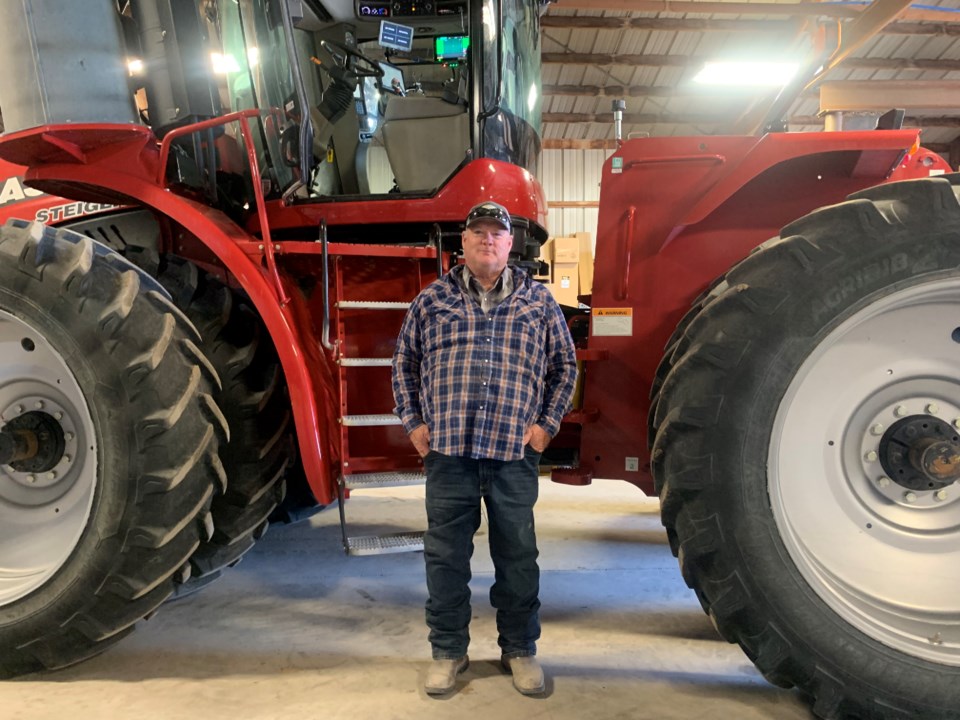A few miles from the Nebraska border on Colorado’s Eastern Plains, Danny Wood’s family has been growing wheat, corn and other grains for generations. Wood is a dryland farmer, which means he relies on rain to water his crops instead of irrigation, so planting has to be carefully timed.
“If you don't get your crop planted, or you lose it in a hailstorm, it’s just devastation because you don't go to work and get a paycheck. There went your paycheck,” he said in an interview just before this year’s planting season.
Wood has over a million dollars worth of farm equipment like tractors, planters and combine harvesters to manage his 8,000 acres of crops. He bought his massive computerized red tractor just over a year ago. It is controlled by touch-screen monitors and can even be programmed to carry out tasks like tilling and planting a field autonomously.
When the new tractor broke down during planting season last year, however, he had to wait four days for an authorized technician to come fix it – at a cost of nearly $10,000.
“We tried everything. Couldn't get it to work. So, we just waited for them to come and he put that code in,” Wood said. “If they would have just told us the code, we could have put it in ourselves.”
Wood’s experience is far from unique. Farmers and ranchers across Colorado can’t fix their equipment because manufacturers don’t give them access to the specialized tools and technical manuals to do so.
That’s going to change soon, however. A new state law recently signed by Gov. Jared Polis guarantees the right to repair one’s own agriculture equipment by requiring manufacturers to hand over parts, software, instructions, and other necessary tools. The law takes effect on January 1, 2024.
The law is the first of its kind in the U.S., although other states have tried and failed to pass similar legislation, including Florida, Maryland, Missouri, Montana, New Jersey, Texas and Vermont.
The head of the National Farmers Union, Rob Larew, said that’s mostly because lawmakers don’t understand the problem. To him, it’s an individual rights issue.
“If we think about it as our car or our phone or something like that, we have this idea that this is our property, right?” Larew told KUNC. “Farmers are very independent. They feel the exact same way about their equipment that they've made an incredible investment in.”
State Rep. Brianna Titone helped write Colorado’s new right-to-repair law.
“This puts them in that category of being able to have the latest, greatest equipment, be able to stay on top of their repairs, and keep the production going,” Titone said. “Producing more stuff to grow and feed our communities – that’s a good thing.”
Titone sponsored the new legislation along with Republican Rep. Ron Weinberg. Most of his GOP colleagues voted against the bill though, including Rep. Richard Holtorf.
“This is big government forcing business to do things, perhaps against their will. It's an overreaching extension of government.” Holtorf said. “The real problem is we don't have enough technicians out there.”
Manufacturing trade groups also have fought bills that allow user repairs. Joani Woelful, president of the Far West Equipment Dealers Association, which represents agriculture equipment dealers across the Western U.S., said the industry has put a lot of time and money into training technicians.
“They want to take everything that the industry has done, all the investment that they've made in their employees, and they want you to hand it over to them,” Woelful said.
Woelful and Holtorf say farmers and ranchers often have to wait days for a technician to show up because there aren’t enough to go around.
Danny Wood, back in northeastern Colorado, is one of Rep. Holtorf’s constituents. He said the new state law will help take some pressure off the technicians.
“They're gonna have plenty of service,” he said. “When it takes five days for him to come look at your combine and three days for him to come back and look at your tractor, they're overbooked anyway, so they need some other help.”
He just wants farmers like himself to be able to fix what they can, when they need to, so they can successfully plant and harvest their crops.



